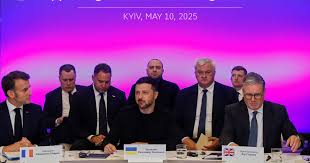In a powerful show of unity, four key European leaders — UK Prime Minister Sir Keir Starmer, French President Emmanuel Macron, German Chancellor Friedrich Merz, and Polish Prime Minister Donald Tusk — made their first joint visit to Ukraine. Traveling together by train, they arrived in Kyiv to meet with President Volodymyr Zelenskyy in a bid to reinvigorate peace efforts in the region.
The timing of their visit was crucial. Backed by U.S. President Donald Trump, the leaders jointly called for an unconditional 30-day ceasefire between Russia and Ukraine, beginning Monday. The ceasefire proposal is aimed at providing breathing room for negotiations and potential peace talks.
Speaking in Kyiv, Sir Keir made the alliance’s message clear: “Together with the U.S., we are calling out President Putin. If he rejects peace, we’ll respond—with tougher sanctions and more military aid for Ukraine.”
The united front was reinforced with a 20-minute call to President Trump, updating him on what has been dubbed the “coalition of the willing.” The coalition includes military leaders from around 30 countries working on plans for a possible peacekeeping force, should the ceasefire take hold.
Though the Kremlin hasn’t yet accepted the proposal, Russian spokesperson Dmitry Peskov admitted they were considering it, calling the situation “new developments.”
Ukrainian President Zelenskyy, speaking to reporters, emphasized the need for the ceasefire to cover land, sea, and air, noting that violations would be met with even stronger sanctions. “We have no illusions,” he said. “We expect breaches, but we are ready.”
The ceasefire comes just days after Putin’s own unilateral truce — widely dismissed by Ukraine as a hollow gesture. Now, with coordinated pressure from both Europe and the U.S., hopes for a more structured pause in the conflict have gained momentum.
Macron added that the ceasefire would be closely monitored, primarily by U.S. and European forces, and that “massive” sanctions would follow any Russian defiance.
As the European leaders pulled into Kyiv, the train station’s screen displayed a message that read: “Bravery Express” — a symbolic title reflecting the gravity of their mission.
The visit concluded with a solemn moment as the leaders, alongside Zelenskyy, visited a war memorial in central Kyiv to pay their respects to the many Ukrainian soldiers who have died in the ongoing war.
Despite the growing momentum behind this new push for peace, skepticism remains. Ukraine, having endured years of destruction and loss, is cautious. As one analysis pointed out, Ukrainians aren’t eager to trade territory for peace. They want the tools to finish the fight and reclaim their homeland — not a deal struck over their heads.
Still, the presence of top European leaders in Kyiv and their firm alignment with the U.S. signals a renewed, if fragile, hope that diplomacy could create space for a different path forward.

